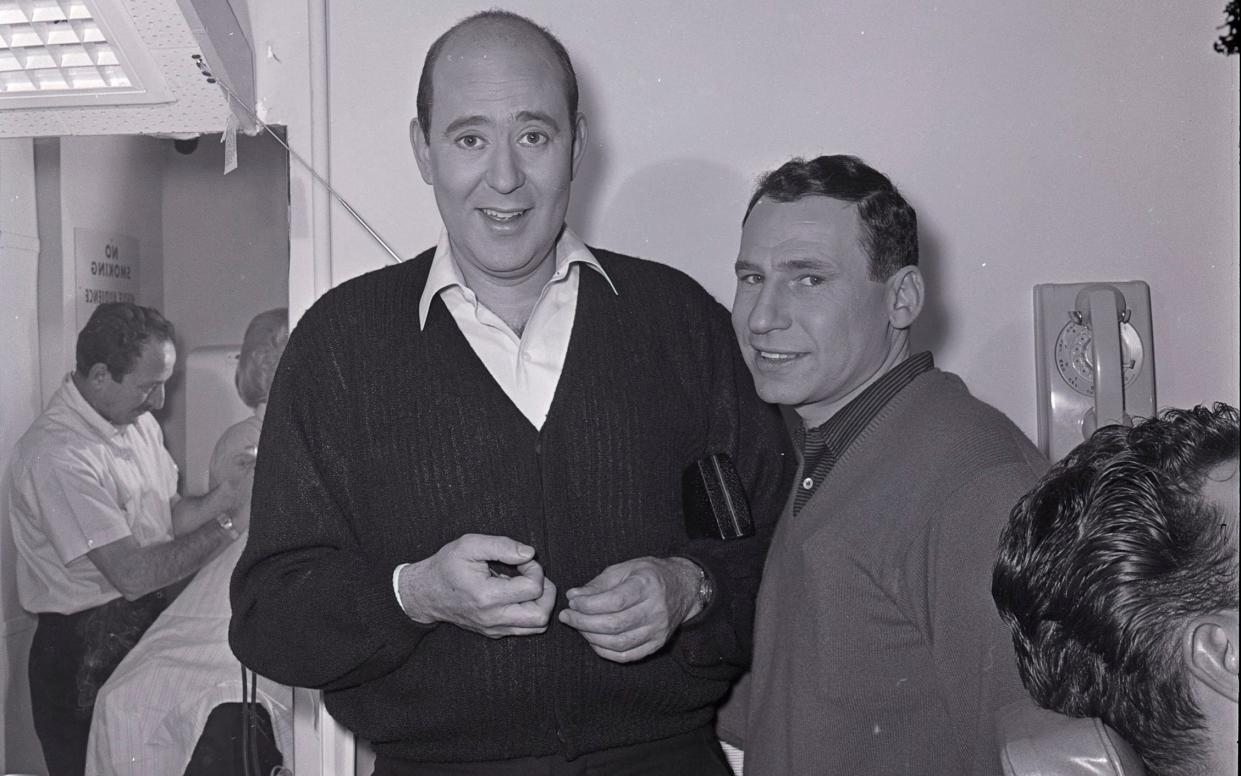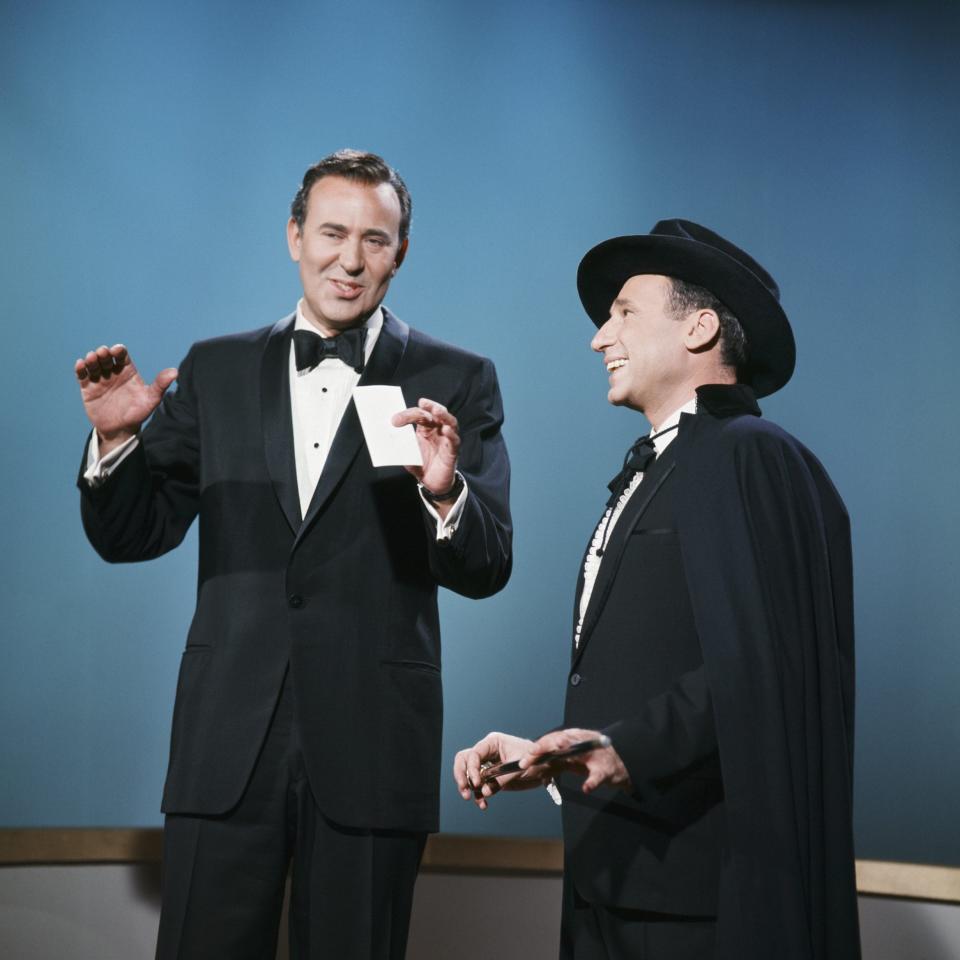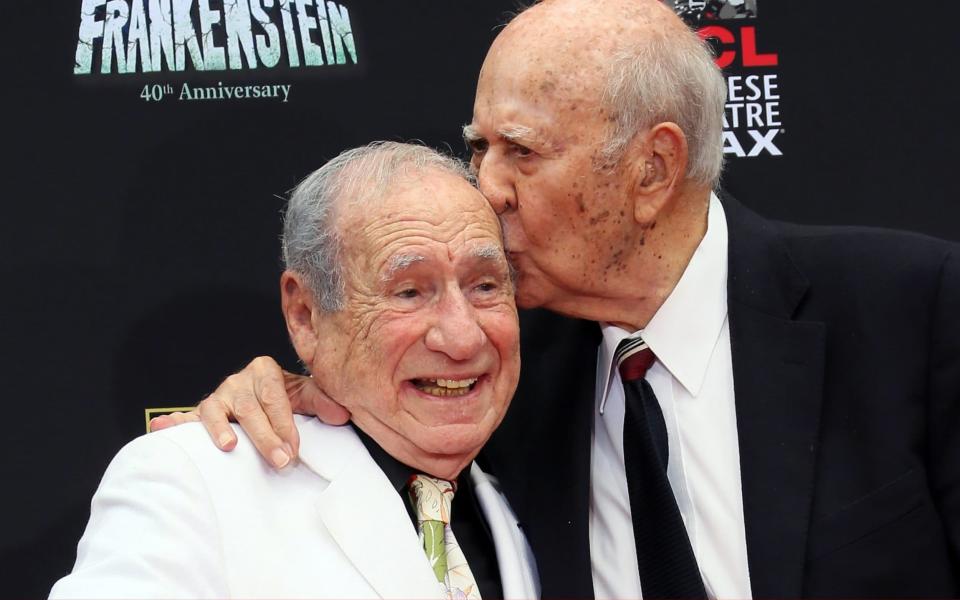Why Carl Reiner loved Mel Brooks: 'If he doesn’t come over, I don’t know what to do with myself'

For the past decade, comedian and director Mel Brooks would drive from his home in Santa Monica to Rodeo Drive in Beverly Hills to have dinner and watch television with Carl Reiner, who died on Monday at the age of 98. The pair had been best friends for seven decades. “I got friendship, love and free food,” Brooks joked.
Even social distancing requirements could not dampen their desire to talk every day, and the long-time pals found ways to keep up their routine during the coronavirus pandemic. “We watch Jeopardy! together,” Reiner told CBS News in April. “Yeah, we turn on Jeopardy! at the same time, and we turn on Wheel of Fortune at the same time, and we try to guess the answers and, you know, we have fun on the telephone.”
Reiner’s death from natural causes at his California home must have been wretched news for Brooks, who said he never had a better friend than the man born Carlton Reiner in The Bronx on March 20 1922. Reiner, whose parents encouraged a love of comedy and urged him to watch Marx Brothers movies as a child, said comedy was his second choice for a career, because he wanted to emulate his hero Enrico Caruso and become an operatic tenor. “All I lacked was pitch and timing,” he joked, adding “but comedy was great because there is nothing better than getting a laugh; it makes everyone happy.”
He eventually earned acclaim as one of the founding fathers of television comedy, earning his spurs as a writer for television pioneer Sid Caesar before becoming the creator and co-star of the classic sitcom The Dick Van Dyke Show. Screenwriter Carl Gottlieb, who worked with Reiner and Steve Martin on The Jerk, said that Reiner was a skilful comedian and director in his own right.
“He wrote on Sid Caesar’s Your Show of Shows, arguably the most sophisticated comedy to come out of television in the last 70 years,” said Gottlieb. “So that collaboration produced a lot of great jokes. There was the water cooler that has crystal glasses instead of paper cups. That was a Carl Reiner joke.”
It was while working on Your Show of Shows in 1950 that Reiner, who had risen to the rank of corporal serving in the Second World War, met Brooks, who was 24 at the time, four years younger than Reiner. “I came to work as Sid Caesar’s straight man. And there's this little guy in a room, I didn't know who he was, and he's impersonating a Jewish pirate,” recalled Reiner. And I'll never forget those first words. He says, ‘You know how hard it is to set sail these days? You know what they're charging for sail cloth? $1.37 a yard!’”
During a lull in the writer’s room, they began larking about around a monologue Brooks had started about being the world’s oldest man. Reiner turned to Brooks and asked him what he remembered about watching the Crucifixion. In a Jewish-American accent, Brooks ad-libbed deadpan replies that were full of hilarious satirical anecdotes about history. Reiner was the perfect foil for his offbeat humour, and was content, he said, to play “second banana” to such a “massive first banana”.
Brooks’s monologues flowed with wit. “I have over 42,000 children and not one of them ever comes to visit!” he would say to Reiner, who played the straight-man interviewer. Asked why the cross became a symbol for Christianity, Brooks replied instantly: “It was easier to put together than the Star of David.”

Their routine became a staple of Hollywood parties for the next decade, with guests falling about laughing at their sketches. Asked to explain his longevity, Brooks’s character replied: “I never run for a bus – there’ll always be another.” When fellow comedian George Burns heard them perform the routine, he told them it was comedy gold. “After he heard us he said, ‘fellows, is there an album here?’ We said, ‘no, there's no album’. He says, ‘put it on an album, or I'm going to steal it. He actually said that,” Reiner told NPR in 2010.
Steve Allen offered up his recording studio and the pair ad-libbed for two and half hours. They cut the recording down to 47 minutes and in 1960 the pair released 2000 Years with Carl Reiner and Mel Brooks on World-Pacific and then Capitol Records. Billy Crystal described the album as “the comedian’s Bible”.
“We weren’t sure that it was for everybody and thought only Jews would like it,” Reiner told PBS News in 2016. “Cary Grant popped by and I said, ‘Oh, I have a record and I think you are going to like it – he came back the next day and said ‘could I have a dozen?’ Later he went to England and told us the Queen Mother loved it… he played it to her at Buckingham Palace. Mel said, ‘well, if the biggest shiksa in the world loves it, we're home free.’”

The sketch evolved into a perennial television favourite and the basis for four further comedy albums, including one recorded live at the 1962 Cannes Film Festival. The last album in the series, The 2000 Year Old Man in the Year 2000, earned a 1998 Grammy Award.
Reiner considered Brooks to be “the funniest human being in the world – because he is connected to the absolute truth”, and said his friend “has made me laugh as much as any human being can make another person laugh.” Reiner said that although he was “astounded” by his improvisational comedy on all the routines for The 2000 Year Old Man, he was in awe of how naturally funny Brooks was in real life. “Mel once described catching a mouse in his house, and the story went on for 25 minutes. He impersonated the mouse and everyone involved. It was such a piece of genius that he couldn’t ever repeat it again. All of us who were there remember to this day and it wasn’t ‘a bit’, it was just him telling a story in his house,” recalled Reiner.
Reiner was no comedy slouch himself. He earned 12 Emmys in his career. He directed George Burns in the title role of the 1977 comedy film Oh God! and collaborated with Martin on three hit movies, The Jerk, Dead Men Don’t Wear Plaid and The Man with Two Brains. Martin described him as “my greatest mentor in movies and in life” on a Tweet marking his death. “Dead Men Don't Wear Plaid was my favourite of all the movies I ever did, because it was like doing a Sunday crossword puzzle and beating it,” said Reiner.
In 2001, he made a big-screen comeback playing elderly con artist Saul Bloom, who comes out of retirement to join George Clooney and Brad Pitt in the remake of the heist film Ocean’s Eleven. Reiner returned to that role in two sequels. He worked into his nineties, including on a documentary about senior citizens called If You’re Not in the Obit, Eat Breakfast.
He also wrote his fourth memoir and became popular on Twitter, gaining 370,000 followers. “There’s always something you want to say to somebody, and when you’re alone at night, you say it to the world. There’s a man named Trump who needs dumping on every night, and so I do that,” he told the LA Times.
Reiner’s wife Estelle, who had been his partner for nearly 70 years, died in 2008. He said he could not have asked for “anything more” in life than having such a loving wife. It was Estelle who delivered the famous line “I’ll have what she’s having” to Meg Ryan in When Harry Met Sally, a film directed by their son Rob Reiner.
Brooks’s wife Anne Bancroft died in 2005 and the widowers sought even greater solace in each other’s company. There is a touching episode of Jerry Seinfeld’s Comedians in Cars Getting Coffee in September 2012 in which the comedian joins the pair for one of their cosy, chatty dinners. Reiner praised Brooks to Seinfeld, describing his 1967 film The Producers as artistic genius, “the definitive work against Hitler in the world”. They were both glowing about each other when they appeared separately on Marc Maron’s WTF podcast.
Although Reiner and Brooks will be remembered for creating some of the most memorable comedy of the 20th century, it is uplifting to remember them too as such supportive friends. “If you have one good friend you’re lucky. I have one good friend. I call him my best friend,” Reiner said in 2016. “My life is fuller because I have had Mel in my life. He comes over every night. If he doesn’t come over, I don’t know what to do with myself.”


